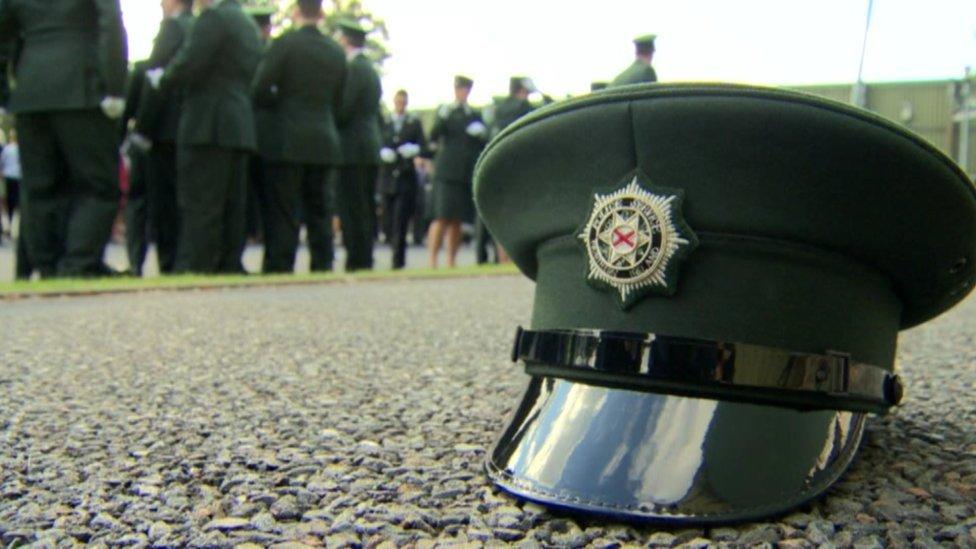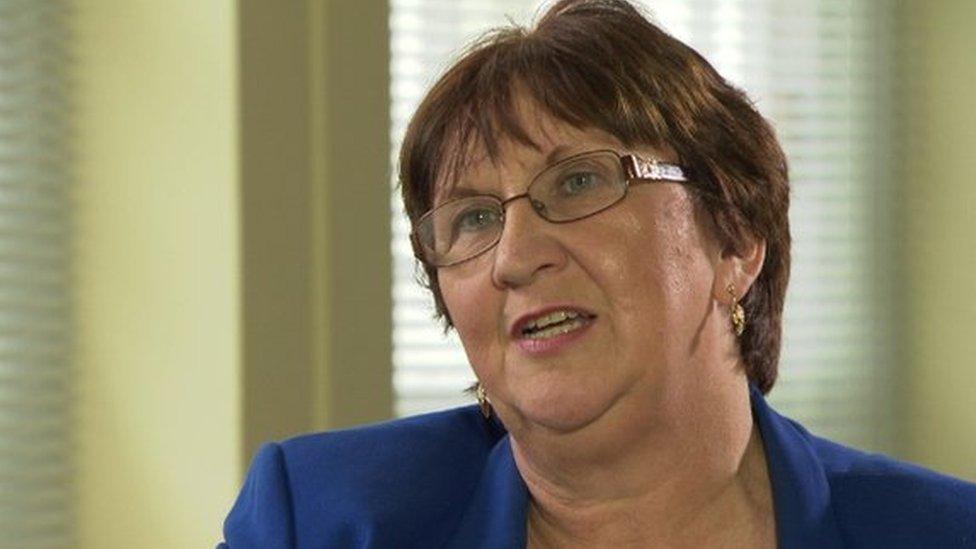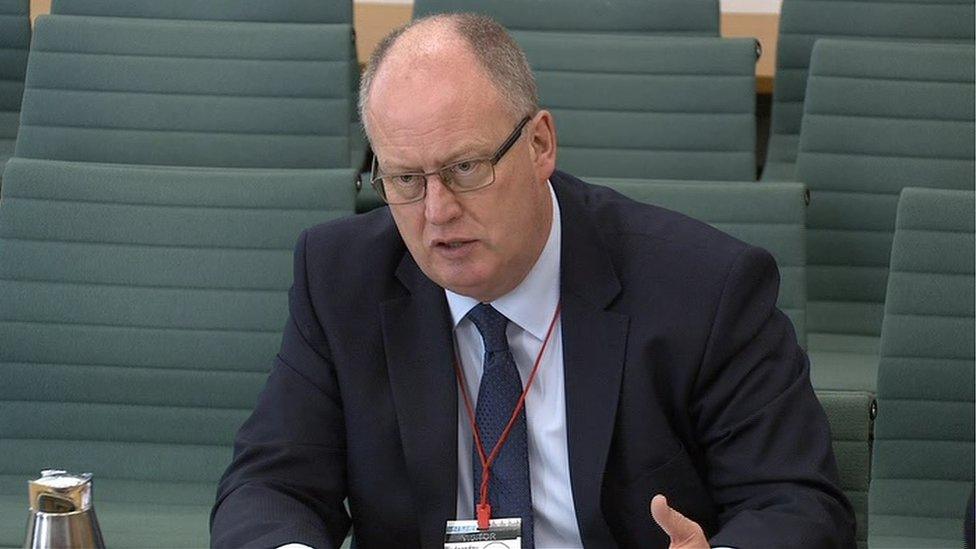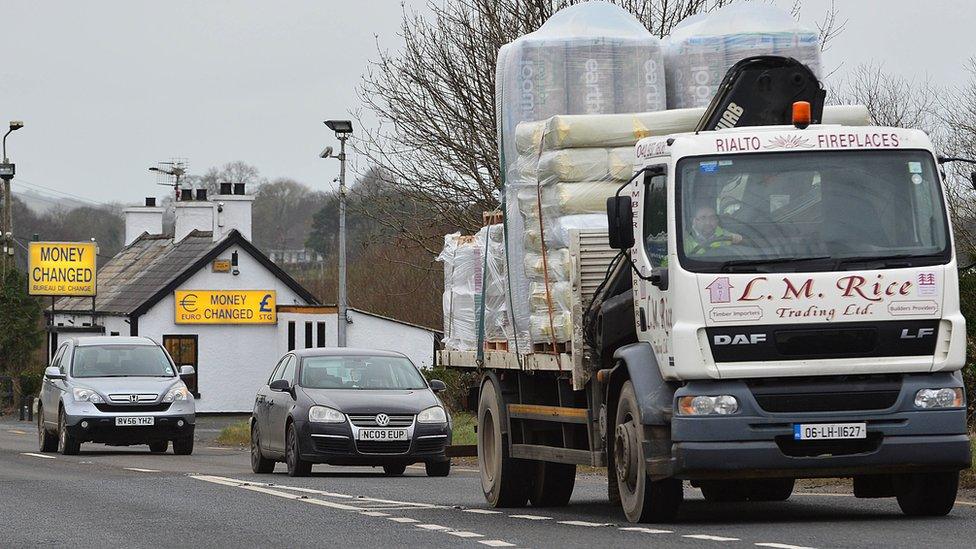Catholics 'must be encouraged to join PSNI', says George Hamilton
- Published
The number of Catholics in the PSNI could start to drop, says George Hamilton
Catholics must be encouraged to seek a career in policing by community leaders, PSNI Chief Constable George Hamilton has said.
Mr Hamilton said while 32% of PSNI officers are now from the Catholic community, that figure is likely to fall "if nothing changes".
He said both the application rate and success rate of Catholics "falls well below" what it should be.
Mr Hamilton is retiring as chief constable later in June.
Appearing on BBC News NI's The View, he was asked if the level of recruitment from the Catholic community is significantly below the level where he would like it to be.
He replied: "Yes it is, but the organisation is more representative than it's ever been.
"But when we look at recruitment rates into the organisation, then both the application rate and the success rate of people from the Catholic community falls well below that which it is in broader society, i.e. in and around 50%.
"We're sitting today currently at just over 32% (PSNI officers from the Catholic community), but actually the intake rate from people from the Catholic community is such that that figure is going to start to dip if nothing changes."

The PSNI replaced the Royal Ulster Constabulary (RUC) in November 2001, and a 50-50 recruitment policy ran for its first 10 years until 2011.
This meant that 50% of all recruits had to be from a Catholic background, and 50% from a Protestant or other background.
When the policy began about 8% of police officers were Catholics.
Mr Hamilton said it had been the right strategy during a time of change.
"There's a variety of measures that can be taken," he said.
"We have looked critically at our own processes, we've brought external consultants in to help us with that. The changes that we have made have had some impact, but not enough.
"We need civic leadership, especially within the Catholic/nationalist community - political leadership in particular - to get in behind advocating for a career in policing.
"That is where the big gap is, that's where the big void is - we need people to be encouraged to take on the honourable profession of policing and needs to come from the leadership of the Catholic/nationalist community."
'Downward trend'
Speaking on BBC NI's Good Morning Ulster, SDLP MLA Dolores Kelly criticised Mr Hamilton for making a "very sweeping statement" about nationalist politicians.
She insisted her party has been "at the forefront" of encouraging Catholic recruits since the formation of the PSNI and has offered practical support to applicants.
The Upper Bann MLA described the latest recruitment statistics as "very worrying".
"The SDLP cautioned against the removal of 50-50 for very good reasons and that remains our case," she said.
"We've argued that with the secretary of state and with others, particularly when figures are showing a downward trend."

Dolores Kelly disagreed with the chief constable
'On merit'
But Ulster Unionist MLA Alan Chambers said his party has always been opposed to 50-50 recruitment and does not want to see it return.
"It was seen as some form of reverse discrimination and we always believed that the best candidates should be appointed and that should be based purely on their merit, rather than where they worshipped.
"I think that the average person, when they phone 999 and seek police assistance, they're not really concerned about what the religion of the officer is who responds to that call."
Mr Chambers acknowledged that the religious background of the majority of senior PSNI officer was not representative of the wider community.
Of the 68 officers about the rank of superintendent, 57 are Protestant.
But the UUP MLA pointed out that there is "considerable cultural resistance within some areas" to joining the PSNI as well as the "ever present" threat from dissident republicans.
"So recruits from Catholic areas may have to leave their home when they join the police, but that doesn't take the threat away because their parents and their siblings then become vulnerable."
- Published9 September 2018

- Published31 May 2018
